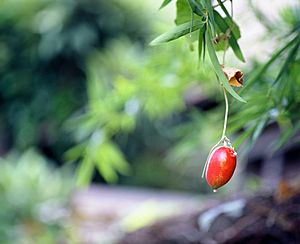Japanese snake gourd facts for kids
The Japanese snake gourd, known scientifically as Trichosanthes pilosa, is a special type of climbing plant. It grows in warm, tropical places and produces a fruit that people can eat. Even though it's called a "snake gourd," its fruit doesn't actually look like a snake!
Quick facts for kids Japanese snake gourd |
|
|---|---|
 |
|
| Scientific classification | |
| Genus: |
Trichosanthes
|
| Species: |
pilosa
|
About the Japanese Snake Gourd
The Japanese snake gourd is a type of vine. This means it's a plant that climbs and twines around other plants or structures. It loves warm weather, so it grows in tropical and semi-tropical areas. The fruit it produces is edible, meaning you can eat it!
Where It Grows
This plant is native to many parts of Asia and even Australia. You can find it naturally growing in countries like Japan, Taiwan, India, Malaysia, Vietnam, and the Philippines. It also grows in various regions of China, including Guangdong, Guangxi, Hainan, Hunan, Jiangxi, Sichuan, Xizang (also known as Tibet), and Zhejiang.
What It Looks Like
The Japanese snake gourd (T. pilosa) is quite similar to another plant called the "snake gourd" (Trichosanthes cucumerina). Their leaves and flowers look very much alike. However, the main difference is in their fruit.
The fruit of the Japanese snake gourd is usually round or shaped like an egg. It's about 7 centimeters (about 2.7 inches) long. Unlike its cousin, the "snake gourd" which has long, thin, snake-like fruit, the Japanese snake gourd's fruit is short and round.

